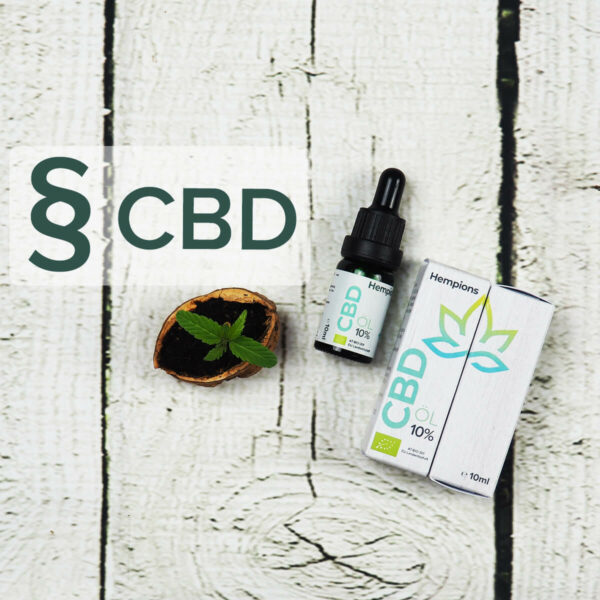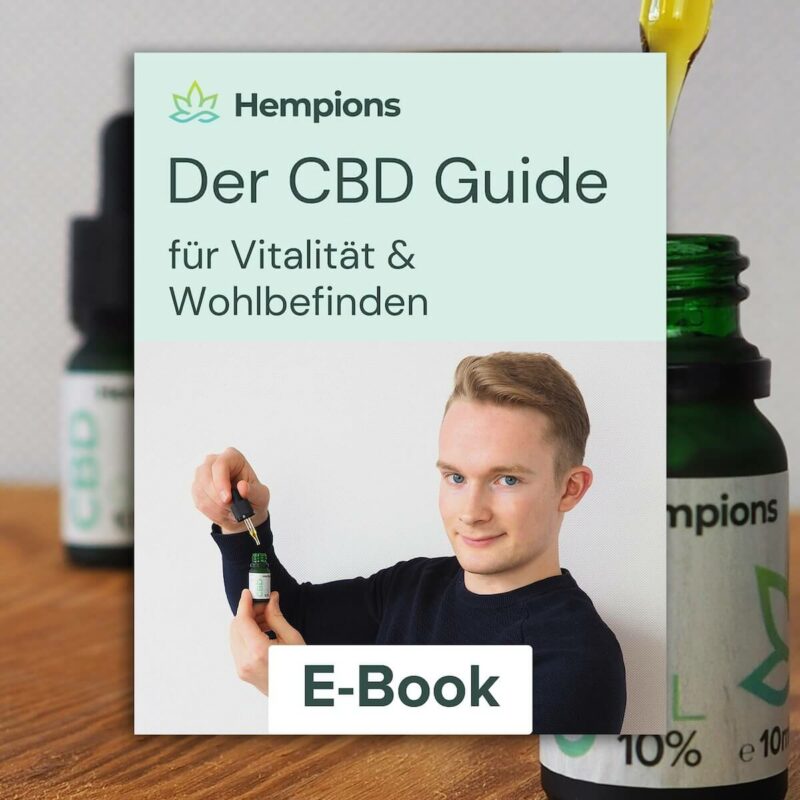In our article on the legal situation of cannabidiol (CBD), we have summarised the most important points for Austria and Germany.
CBD and other cannabinoids are mainly found in the inflorescences, leaves and stems of the hemp plant.
In contrast, hemp seeds and products made from them do not contain any significant amounts of CBD.
The regulations in the article therefore do not apply to foods such as hemp seeds, hemp protein or hemp crunchies.
Even though we have summarised the current situation in the article as best we can, we cannot guarantee legal certainty. This can only be done by an appropriate legal expert.
Overview of CBD legal situation
- Summary
- Novel Food Regulation and CBD
- Legal situation CBD oil
- Legal situation of CBD flowers and tea
- Regulation of the cultivation of CBD
Summary
In the following tables you will find a summary of the current legal situation of CBD (as of April 2020). Clicking on the respective area will take you to the corresponding part of the article.
For consumers
| Area | Germany | Austria |
|---|---|---|
| CBD oil | legal, THC content <0.2% | legal, THC content <0.3% |
| CBD flowers | illegal | legal, THC content <0.3% |
| CBD tea | legal, THC content <0.2% | legal, THC content <0.3% |
| CBD cultivation | illegal | legal, THC content <0.3% |
In the commercial sector: manufacturers and sellers
| Area | in Germany | in austria |
|---|---|---|
| CBD oil | legal, also as a food supplement | Illegal as a food supplement (& cosmetics), legal as a flavouring product with the addition "not suitable for consumption", THC content <0.3% |
| CBD flowers | illegal | legal, as aromatic flowers |
| CBD tea | Grey zone, THC content <0.2% | legal, THC content <0.3% |
| CBD cultivation | legal, as a farmer with registration, EU commercial hemp | legal, as a farmer with registration, only EU commercial hemp |
Novel Food Regulation in relation to CBD
The Novel Food Regulation (VO (EU) 2015/2283) regulates the authorisation of foods for which sufficient experience is not yet available. Therefore, they must pass a safety assessment before being placed on the market.
The Regulation defines substances as novel if they have not been used for human consumption to a significant degree in the European Community before 15 May 1997.
In the EU's public Novel Food Catalogue, Cannabis sativa is listed as "non-novel". Furthermore, there are no restrictions with regard to individual parts of the plant.
In contrast, CBD as a single substance is assessed as Novel Food. Since an authorisation according to the Novel Food Regulation has not been granted, CBD is not marketable. The application for approval of CBD as a novel food has already been submitted to the EU Commission.
This is why the production method plays an important role in CBD products. It applies:
- No Novel Food: CBD content in the product is equal to the CBD content in the source plant. Thus, the product is marketable, provided that the respective further regulations per product group are complied with.
- Novel Food: CBD content in the product does not correspond to the CBD content in the source plant. This means that the product is not marketable as food.
Legal status of CBD oil
In Germany
In Germany, the legal situation for consumers of CBD is uncomplicated: CBD oils from full-spectrum extracts with a THC value below 0.2% are legal.
However, the regulations for manufacturers are more complex. Whether CBD oil is approved for sale in Germany depends on:
- the general provisions of food law: The manufacturer must guarantee the safety of food
- the Narcotics Act (BtMG)
The following points are required for CBD oil to be classified as a food or food supplement:
- THC value below 0.2%
- No citation of healing promises
- Low addition of the active ingredient CBD, which is available only on prescription.
- In the case of foodstuffs, care must be taken to ensure that the added ingredients are not classified as medicinal products due to their pharmacological effect
Pharmacological effect
It is still unclear whether conventional CBD oil has a pharmacological or only a physiological effect. In principle, however, no pharmacological effect is assumed.
Extracted or isolated CBD can be classified as a medicinal product due to its pharmacological effect. This means that isolated CBD would have to be a prescription-only medicine in Germany.
The state authorities can prohibit the sale of CBD oils if they can prove a pharmacological effect.
In Austria
The legal situation for consumers is also straightforward here: CBD oils made from full-spectrum extract with a THC value below 0.3% are legal. Any other form of CBD products are also legal for consumers. CBD isolates and products made from them are in any case not allowed.
For producers and sellers, the situation is more complicated:
In Austria, the sale of food and dietary supplements containing CBD is generally prohibited. The reason for this is a decree issued by the Ministry of Health in December 2018, which refers to the Novel Food Ordinance.
This means that foods and cosmetics containing CBD are generally not legally available for sale in Austria. Furthermore, the addition "Not suitable for consumption" is required.
It is still questionable whether the Ministry of Health's decree is correct. It cannot override existing laws and EU standards, such as the Novel Food Regulation. However, a supreme court decision has not yet been issued.
However, since the hemp plant itself does not fall under the Novel Food Regulation, extracts from the hemp plant can be sold legally. Therefore, many manufacturers of CBD products only offer hemp extracts that contain CBD. These include in particular full-spectrum extracts from the hemp plant.
Legal situation of CBD flowers and CBD tea
In Germany
At CBD flowers the German law for end users is clear: both purchase and possession of CBD flowers is not allowed. The reason for this is in particular that even with a low THC content of the flowers, abuse cannot be ruled out.
In contrast, the regulation in the scientific and commercial sector is different. Flowers made from EU industrial hemp with a THC content of less than 0.2% are legal here. The prerequisite is that they exclude abuse for intoxication purposes.
This is why CBD flowers are often sold as a "primary product - not intended for ingestion". A primary product is a raw material that is used to obtain natural products. Sellers are thus invoking a grey area in the law, which is often a matter of interpretation.
At CBD teathe situation is similar. However, these are not covered by the Novel Food Regulation, as already mentioned before. Tea may therefore be offered as a foodstuff.
However, according to the Narcotics Act, the same applies as for end customers: Abuse of CBD tea cannot be ruled out. The reason for this is that the extraction of THC tea could theoretically be used to produce narcotics.
However, end customers can assume that foodstuffs comply with the legal regulations. The food business operator and the authorities are responsible for compliance with these regulations.
Conclusion:
- We strongly advise against the purchase and possession of CBD flowers. Both are punishable by law, even if there are grey areas in the law.
- In contrast, CBD tea is sold as food. This means that the end consumer can assume that the products comply with the regulations. The manufacturer is responsible for the safety of the food.
In Austria
In Austria, CBD is not subject to the Narcotic Drugs Act. According to the current legal situation for CBD, the possession and consumption of any product is therefore legal. The only requirement is that the THC content is below 0.3%. In contrast to Germany, end consumers are also allowed to possess CBD products. The prerequisite is that no narcotic drug can be easily or profitably obtained in a concentration or quantity suitable for abuse.
We have no information on methods by which the extraction of THC from CBD products is profitable or easy.
Therefore CBD flowers legal in Austria. According to the Ministry of Health, they may not be advertised and sold as smoking products. The reason for this is that the THC content can exceed the limit of 0.3% when burnt. In CBD flowers are therefore mostly offered as "aroma flowers".
CBD tea is clearly legal in Austria. As they are not extracts, they do not fall under the Novel Food Regulation. As they are offered as foodstuffs, the possibility of easy production of addictive substances can also be ruled out.
Conclusion:
- The purchase and possession of CBD products of all kinds is permitted for private individuals. The limit of 0.3% THC may not be exceeded.
- In isolated cases, the police may take CBD flowers for THC analysis. Therefore, always take the invoice from the purchase with you and keep it.
Legal situation for the cultivation of CBD
The regulations on the cultivation of hemp vary greatly. In this chapter we will only go into the most important points.
In Germany
The regulations in Germany for private individuals are clear: growing hemp is illegal. Regardless of how high the THC or CBD content is. Therefore, even the cultivation of a corresponding plant is punishable.
In contrast, agricultural enterprises are allowed to cultivate hemp under certain conditions. The prerequisite for this is that only certified seed of EU hemp is used. For this purpose, the farmer must notify the authorities before sowing.
In Austria
Private individuals in Austria may legally cultivate hemp under certain conditions. Cultivation with the intention of obtaining narcotics is prohibited. Permitted is:
- The cultivation of hemp from the EU catalogue of varieties. The prerequisite is that this never exceeds the THC content of 0.3%.
- Possession of cannabis plants that do not flower - regardless of the variety. However, once the plants flower, they are illegal - especially if the THC content is above 0.3%.

